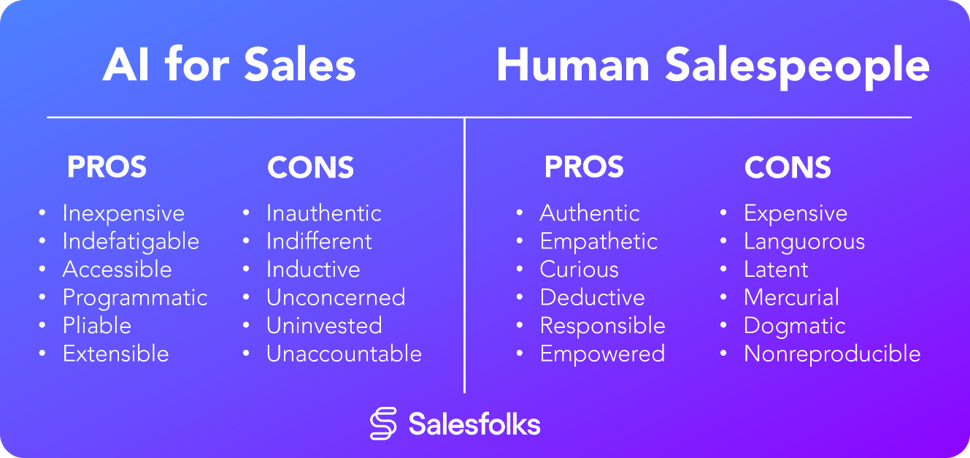Post Type: Help
Will General Artificial Intelligence Depreciate Salespeople?
By Lief Larson
Much of our current understanding of the art and science of sales has derived not from just the basic behavior of selling but also from the information asymmetry that long defined the context under which people sold. Previously gatekeepers of product information, the intel scarcity advantage salespeople once owned has nearly dissipated, and with it so has the power it previously conferred on salespeople. As a result, the ability to motivate people into purchasing motions now depends on accurately understanding a prospective customer's perspective, diving deep inside the customer's head, empathetically viewing the world through his/her eyes, diagnosing the customers *true problem*, mapping it on a solution matrix, and being proactive to intercede appropriately. The role of human-powered sales today is part investigator and part prescriptive tour guide along a path towards not just the purchase, but also the post-purchase outcome.
The advent of ChatGPT has had many sales and revenue leaders contemplating how AI will impact the sales department. An analog started two decades ago was Google; it was suggested that search would kill the need for salespeople because information would no longer be scarce. Instead, search technology has been leveraged to help synchronize and streamline product/service data and collateral access with customers even faster/better. This didn’t kill the need for salespeople, it simply altered their role. As a result, today's most productive sales professionals focus less time hard-selling customers. Rather, they have honed their emotional IQ and listening skills. They are empathetic, authentic, consultative, and they cherish their non-replaceable role in helping a customer de-risk their purchase decision. Furthermore, no AI that can be envisioned today will take responsibility for a customer’s post-purchase outcome tomorrow; accountability is also remains a uniquely human trait.
After countless hours considering AI entanglement in the field of sales, I think it's going to be a difficult challenge for AI to calibrate correctly in a way that directly threatens salespeople. Why? Because effective sales hinges less on problem solving and more on problem finding. Great sales pros are more creative, heuristic, and have honed their problem-finding skills. AI on the other hand is a technician of the reductive and algorithmic and better equipped for problem-solving.
Just last week Google Bard and an AI-powered version of Bing came under the spotlight. These AI advances are indicative of Google/Bing evolving from mere *search engines* – discoverers of the scarce – into *answer engines* that curate the scarce into actionable intelligence. But, this isn’t likely to have a deleterious impact on sales professionals. For at the last two decades customers have been independently researching pre-purchase decisions on the Internet. By the time they land in the CRM or sales execution platform, often the customer is well-informed. So, most businesses are already accustomed to customers coming in from the side of the sales funnel rather than the top. The last mile of the purchase process will not be overcome by AI alone. 
In 2019 I suggested that as AI develops, so will IA, or Intelligence Amplification. IA is the pursuit of leveraging AI to make (human) salespeople even better, more focused, and more competitive. In the IA model you provide your sales team with AI-powered tools and capabilities to connect with and help prospects and customers with more intention, more white glove treatment, and more collaboration. The AI is not a replacement for salespeople, but rather a wholly additive augmentation, when used for IA attainment.
In conclusion, AI isn’t coming to take away jobs from salespeople. It won’t cannibalize the sales field. Salespeople are securely differentiated by their ability to conduct problem-finding exercises, being prescriptive, and taking accountability during and after the buying process. The more likely outcome is that the superpower that AI will imbue on salespeople is less time spent on tedious tasks and more time focused on customer problem discovery and interaction that leads to more satisfying and positive purchasing outcomes.
…
Author’s Note: Aspects of my evolving attitudes around this topic came from original writing I did in 2019 on an adjacent topic specifically relating to sales chatbots and AI. Additionally, I owe thanks to Daniel Pink and his landmark book To Sell is Human which informed much of my thinking over the last decade about the role human salespeople will play in the future of selling, especially during a time of increasingly capable technology and automation. Lastly, I want to confirm that this article was NOT written with ChatGPT. 😉